- Home
- Chris Pierson
Divine Hammer Page 4
Divine Hammer Read online
Page 4
Then his lips tightened with irritation. ”Jolith’s horns, Marto,” he said, lowering the farglass. “That’s a bird.”
“That’s what I told Pell,” the big knight said, “but he made me look again.”
Cathan glanced at Tithian, who shrugged, then looked at Pellidas. The redheaded knight was still watching the circling shadow, the one that had looked to Cathan’s eye like some kind of common raptor. Falcons were widespread in Istar, which was why the first Kingpriests had chosen one for the imperial emblem. Frowning, Cathan raised the farglass back to his eye.
He found the bird again and studied it more carefully this time. There was something unusual about it, something not quite right about the way it moved. Its wings moved jerkily, and its tail feathers didn’t ruffle on the wind. There was something else, too—an odd glint in the gray morning light. It was almost as if…
“What in…” he began, then stopped, frowning. “Is that thing made of metal?”
Pellidas nodded. Marto tugged his beard. “Looks like it, doesn’t it, sir? That’s why I thought you might want to see. I’d reckon the thing’s magical.”
“Good guess,” Cathan muttered. Metal birds were something new, although Cathan had heard tales of animals and even men that wizards made of bronze or iron. He shuddered at the thought. He’d never had much use for sorcery. Marto had even less and was biting the heel of his hand to ward against magic.
He gestured to Tithian, not taking his eye off the hawk, and the boy dashed off, back toward the camp. The bird was searching—he could see its head swiveling this way as it wheeled above. He wondered what the mage who’d sent it was up to. Nothing good, he was sure.
Tithian was back before long, holding a crossbow and a quiver of quarrels. He strained to cock the weapon, loading it before handing it to his master. Cathan shook his head, though. “I can barely see the blasted thing from here,” he said, and looked to the other two knights. “Which one of you is the better shot?”
“That’d be Pell,” Marto said.
Sir Pellidas took his eyes off the hawk long enough to take the crossbow from Tithian, then looked back up, sighting along its length. He licked his lips, tracking the hawk across the sky, tightened his grip, and squeezed the trigger.
The string snapped forward, and the quarrel streaked away. Cathan followed its flight until he lost sight of it—then there was a faint, high clang. Marto laughed, clapping Pellidas on his shoulder; the redheaded knight smiled slightly as he handed the crossbow back to Tithian.
Cathan saw the hawk again a moment later, without the farglass. It was dropping now, plummeting earthward like a spent arrow. He watched it fall, wings hanging loosely. It hit the ground with a thud, fifty paces away.
Ebonbane made it all the way out of the scabbard now. Pellidas and Tithian drew their own blades, and Marto pulled a beaked war axe from his belt. Together they crept out of the trees, toward where the bird had hit.
It was half-buried, having dug a furrow in the grassy earth. Now it lay motionless, one wing snapped off, the other bent out of shape. It was a falcon, Cathan saw, but its plumage was copper and silver, its beak made of gold. Its eyes were yellow gems—sapphires, maybe, or topaz. The quarrel, made of hard steel, had caught it mid-breast and punched out its back. Pellidas nudged it with his boot, then reached down and yanked the bolt free. As he did, more bits of metal spilled out of the hole: tiny, toothed gears and springs knocked loose by his shot.
“Karthayan clockwork,” said Marto, who would know. He was from a small town near the fabled capital of Falthana, a rich city known for its tiered gardens and fine tinkers.
Some said the Karthayans had gnomish blood, such was their fondness for mechanical inventions.
Never having seen one, Cathan doubted the existence of gnomes. The thought of a race of mad engineers was altogether strange to him. There was no doubting, though, that the bird wasn’t magical at all. It was some sort of curious machine.
“Have you seen anything like this before?” he asked.
Marto shook his head. “Haven’t been back to Karthay in ten years, though. Gods know what they’ve been up to there.”
“There’s something tied to its leg,” Tithian said.
Cathan raised his eyebrows, then looked closer. His squire was right. Affixed to the hawk’s leg was an ivory tube, the sort of thing couriers used to keep scrolls safe from bad weather. There was something more—a platinum plaque attached to it. Etched into the metal was a symbol Cathan knew well: a noble falcon, clutching Paladine’s sacred triangle in its talons.
Marto roared with laughter. “The imperial arms!” he bellowed. “Branchala bite me, Pell—that’s the Kingpriest’s toy you killed!”
Sir Pellidas winced, his ruddy face turning bright crimson. Cathan had to fight back a chuckle. “It’s all right,” he told the mute knight. “You did it by my order.”
He tapped the broken bird with Ebonbane’s tip, making sure it wasn’t going to spring back to life, then bent down and pulled the scrolltube from its leg. Even before he broke the seal that covered the cylinder’s cap—blue wax, with the falcon-and-triangle stamped in it as well—he guessed the missive inside was for him. Sure enough, it was.
Cathan, the scroll read—in the Common tongue, for Cathan had never been very good at reading the language of Istar’s church—my old friend:
I write this epistle with mixed feelings in my heart. I had hoped to be joyful, for the twentieth anniversary of my coronation draws nigh. Indeed, I meant to summon you to my side anyway, to celebrate that glorious day. Sadly, though, I have heavier tidings to tell.
Marwort the Illustrious, who has long served me as envoy of the Order of High Sorcery, has died.
I know you have no love for wizards. Nor do I, be sure: The Black Robes remain a blight in the god’s sight, and those who wear the White and Red shame themselves by associating with such fiends. Marwort, however, has remained a steadfast part of my court for as long as I have ruled. I may not have approved of his sorcerous ways, but he was still a friend to the empire, and I mourn him.
For this reason, my friend, I am summoning you back to the Lordcity. Soon the Conclave will send a new wizard to take Marwort’s place. I would like you at my side, as you were in olden days, when they do. Return to Istar at once.
Beldinas Pilofiro
Voice of Paladino and true Kingpriest of Istar
PS: I hope the bearer of this missive amuses you. It is a new device, a gift from the Patriarch of Falthana. I am eager to hear what you have to say about it.
Cathan read the scroll twice, then rolled it up again and tucked it into his sleeve. The Kingpriest was right, he cared nothing at all for Marwort. The old wizard had seemed harmless enough, had even sided with the empire against his own order a few times. More than a few, actually. But he was still a sorcerer, and not to be trusted. With the Conclave sending a new wizard to take his place…
Cathan’s eyes went back to the broken hawk sprawled in the soil and wet grass. He sighed, then turned back toward the knights’ camp.
“Bring that,” he said to Marto and Pellidas as he strode into the wood, Tithian at his heels. “The pieces, too, and be quick about it. We ride for the Lordcity within the hour.”
CHAPTER 3
Twelfthmonth, 942 I.A.
There were five Towers of High Sorcery in the world, each of them old beyond telling and alive with the power of the moons above. Four stood within the cities of mortal men, constant reminders of magic’s might. They loomed over Daltigoth, the Capitol of Ergoth, and Palanthas, the greatest city in the knightly realm of Solamnia. Istar, for its part, had two—one in the Lordcity itself, and one in Losarcum, the fabled Stone City, which had been the heart of the kingdom of Dravinaar before war and annexation made that proud realm into the Holy Empire’s two southernmost provinces.
Mages of all robes—the White of good, the Red of neutrality, and even the hated Black—dwelt within the Towers studying and teaching magic, united by thei
r love for their Art.
Each held artifacts and lore of inestimable value, as well as vast laboratories where the most learned wizards toiled to discover new uses for the magic. Those few common folk who had been inside the Towers spoke of countless wonders: demons imprisoned in shards of crystal, hallways and rooms that changed size and shape without warning, windows through which one could gaze out upon lands hundreds of leagues away. Statues got up and moved when no one was looking, and flashes of light and eerie sounds came from nearly every door or window. Even in Daltigoth, where they tolerated magic, folk gave wide berth to the Tower, and to the surrounding grove of enchanted pine trees. In the other cities, where people viewed magic and its practitioners with suspicion, they gave the lofty spires dark glances, signing the triangle or Jolith’s horns or the twin teardrops of Mishakal against whatever evils lurked within.
Of all the Towers, however, the greatest was the one folk didn’t see. It stood not in any city, but deep, deep in Wayreth Forest, an eldritch wood in the north of Kharolis. The forest appeared on few maps, for it tended to move, bordering the fabled elf realm of Qualinesti one day, tucked among the hills near the city of Xak Tsaroth the next. Such was Wayreth’s curious power that none saw the Tower except those the mages wished to see it. From everyone else, the Tower hid.
It was a strange-looking structure of a style seen nowhere else on Krynn. Surrounded by triangular walls, it consisted of a pair of obsidian cones, raised from the earth’s bones by forces of forgotten power. Narrow slits of windows broke up its black, gleaming surface. It had no battlements, no turrets. Hidden by the forest and protected by the power of sorcery, it had no need of mortal sentries. Within dwelt the mightiest wizards in an Ansalon: men and women whose power in the Art knew no equal. Even Fistandantilus the Old, the legendary archmage called the Dark One by his fellow Black Robes, kept apartments at the Tower, though—to general relief none had seen him there in centuries. There was no place in all of Krynn more alive with magic.
Leciane do Cirica stared up at the two towers, reaching up toward the stars like the claws of the great dragons that once had filled Ansalon’s skies. Solinari, round and bright, made the northern tower gleam with silver light. Lunitari, also full, made the southern one seem dipped in blood. Nuitari was up there somewhere too, Leciane knew, but she could not see it. She was no Black Robe, but rather wore the Red of those who walked the path between light and shadow.
The night wind gusted, cold enough to make her shiver. Around the Tower the forest remained green, but the tang of winter was in the air. It blew back her hood, momentarily uncovering a dusky face that had been breathtakingly beautiful when she was a girl. Even now, with her fortieth year behind her, she made most women half her age seem plain. The lines around her eyes and mouth, the threads of silver that crept through her long black curls, only accentuated her loveliness. Her green eyes sparkled with equal parts amusement and annoyance as she grabbed for her hood and pulled it down over her face again.
She had been at Losarcum’s Tower when the summons found her. She had residences both there and at Daltigoth, where she had taken the Test to become a full-blooded wizard.
The message had come not as words written on parchment or vellum but rather as a pair of disembodied lips, which had appeared before her and bidden her come at once to Wayreth.
She had obeyed, and now she was here, the mouth still floating in the air beside her. It was hard to tell but she thought it had a smug look to it.
“Well?” she asked. “No one to meet us?”
The pointed tip of a tongue poked out, running over the ruby lips. “Be patient,” the mouth said. “The Conclave are in discussion now. They will call you soon.”
She scowled. The Conclave, the rulers of High Sorcery, consisted of the orders’ strongest wizards, its most influential. A powerful sorceress in her own right, Leciane hoped one day to ascend to their ranks. For now, though, she was as bound to do their bidding as any neophyte fresh from his Test. Still, that didn’t keep her from glowering at the twin spires.
She’d spent a great deal of energy getting here, using the Art to speed her travel. Now, to be kept waiting…
The mouth twitched, then curled into a grin full of pointed teeth. At the same time, the air around Leciane shivered, shimmered with silver sparks. They fell upon her, cold where they touched her dark skin. She didn’t flinch at them, or at the sinking in her stomach as the spell took hold. This wasn’t the first time someone had cast a teleportation spell on her.
“Go, then;” said the magical lips, still smiling. “The Conclave welcomes you, Your Excellency.”
Excellency? Leciane thought, glancing at the lips. The lips chuckled, then disappeared.
With a silver flash and a shimmer of noise, so did she.
*****
The Hall of Mages was a vast, dark chamber in the heart of the South Tower, its full dimensions lost amid shadows. No lamps or candles lit it; only a dim, blue-white glimmer in its midst. Darkness hid its walls, ceiling, and much of the floor. Neither did the hall have any doors. The only way in was by magic, and powerful wards kept out all but the Conclave and those they allowed to enter. Once, an ambitious Black Robe had tried to force his way past those wards. Sometimes, it was said, the echo of his howls could still be heard through the Tower’s halls.
In the room’s midst, at the edges of the pool of light, a half-circle of chairs stood atop a raised platform. There were twenty one in all—seven each for the followers of the three moons. Wizards sat in each of them, clad in hooded robes, their faces drenched in shadow.
On the left, seven dressed in the White of Solinari—two of them elves from ancient Silvanesti, the rest human. On the right, an equal number of Black Robes, serving Nuitari, among them a gray-bearded Daergar dwarf. Between the two groups were seven of Lunitari’s Red Robes, all of them human. In their midst, the only one among the Conclave who did not wear a hood, sat Highmage Vincil, the leader of all Krynn’s sorcerers.
He was an Ergothian of more than sixty summers, his skin as dark as polished mahogany. His head was smooth-shaven, save for a white ponytail at the back, and his beard was long and shovel-shaped. He steepled his fingers, saying nothing as he gazed down from his seat. His gray eyes might been hewn of granite.
Leciane stood before him, unafraid. She had known Vincil before he became highmage, even before the Red Robes had invited him to join their delegation on the Conclave. She had been his apprentice, both before and after her Test. She had also been his lover. All that was in the past, ten years and more, but they had remained friends since.
She raised her eyebrows, arms folded across her chest.
“What do you mean, ‘excellency’?”
The archmages glanced at one another, stirring slightly. She looked to either side.
Neither the Black Robes nor the White seemed happy. Ysarl, the most-powerful of the evil mages—Fistandantilus did not serve on the Conclave, fortunately—let out a snort, his wizened features contorting. Jorelia, on the side of good, shot the aged Black Robe an imperious look.
Vincil ignored them, his gaze never leaving Leciane. “Marwort is dead,” he said.
Leciane knew she should have felt sadness at that news, but she did not. Indeed, if anything, she felt relief. Marwort the Illustrious had been a sore spot among the three orders. A White Robe of no small power, he had served in the imperial court of Istar for some forty years. At first; he had proved a capable emissary, but as the years passed he had come to side more and more with the Kingpriest against the wishes of the Conclave—particularly since the empire’s current ruler, the one they called Lightbringer, took the throne. Given the Lightbringer’s rejection of the Doctrine of Balance and his quest to destroy all evil in the world, the Black Robes understandably had come to loathe Marwort.
The Red Robes had been no more comfortable, for the place of those who followed the neutral path was uncertain in Istar these days. Even many who wore the White had been disenchanted with Marwo
rt, a creature they could not control. When a Conclave appointed an ambassador, though, it was for life, so the archmages had had little choice but to wait for Marwort to die—something he had stubbornly refused to do. Until now.
It had been quick, Vincil said. A blood vessel in his brain had burst while he slept. That made it clear the Black Robes hadn’t finally carried out their threats to have Marwort killed. They would not have made it so painless—not when the regime he’d supported made a point of burning every dark-robed mage it could find. The White Robes had claimed his body, entombed it beneath the Tower in the Lordcity, not far from the Temple where he had served for so long. The Conclave, meanwhile, had convened to begin the important step of naming a replacement.
Leciane smiled, imagining what those “discussions” must have been like. Each order wanted the new ambassador to be one of their own: the Black Robes as an act of defiance, the White Robes for amelioration, and the Red as, perhaps, a bit of both. In the end, the White Robes would not accept a Black Robe ambassador to the Great Temple of Paladine, and the Black would not allow another White to take Marwort’s place, so Red was the compromise. Nobody was happy, to be certain—Ysarl’s grumbling and Jorelia’s glare made that much clear—but it was the only course that wouldn’t crack the orders’ tenuous solidarity.
“And so, Leciane,” Vincil concluded, “I have called you here. All know you are trustworthy and devoted to the Art. All know you will speak on the orders’ behalf, even if it makes those around you unhappy. After much discussion we have chosen you to represent us at the Kingpriest’s court.”
Leciane’s breast swelled. She did her best to hide her joy, but she could tell by the way the corners of Vinci1’s mouth twitched that he had spotted the gleam of pride in her eyes.

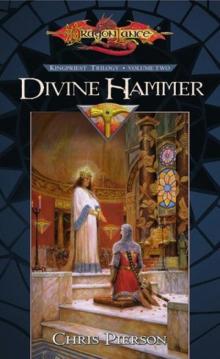 Divine Hammer
Divine Hammer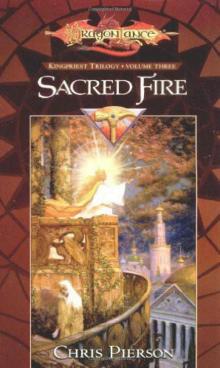 Sacred Fire
Sacred Fire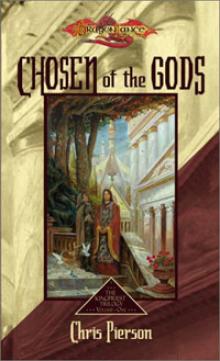 Chosen of the Gods k-1
Chosen of the Gods k-1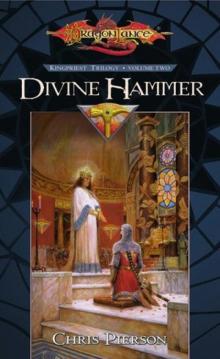 Divine Hammer k-2
Divine Hammer k-2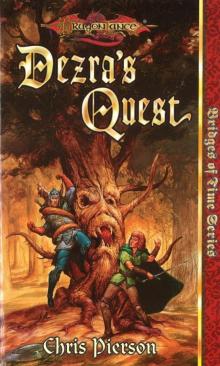 Dezra's Quest
Dezra's Quest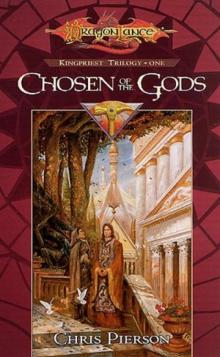 Chosen of the Gods
Chosen of the Gods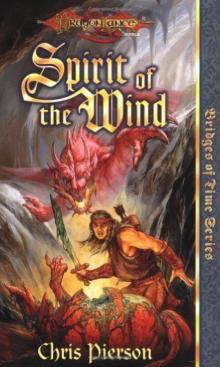 Spirit of the Wind bot-1
Spirit of the Wind bot-1